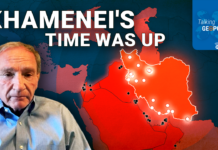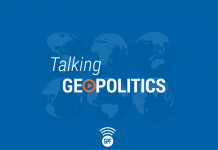The drawdown of U.S. forces in the Middle East, about which we have written a few times now, is already empowering the countries that would replace it as a regional power. The evolution started with the U.K. and ends with Israel.
Indeed, much of the region was shaped by Britain after World War I and the collapse of the Ottoman Empire. The British invented new countries like Jordan, reshaped the political order in Arabia, redefined the Persian Gulf and so on. Britain was Rome reborn. The Romans were obsessed with access to Egyptian grain. The British were obsessed with access to the oil of the Persian Gulf. They were transitioning from a coal-driven to an oil-driven economy but could not do so without controlling the Middle East. Controlling a region, however, is fraught with danger. The more you control, the more things threaten you.
After World War II, there was the famed changing of the guard, with the British sounding Kipling’s recessional and the Americans taking Britain’s place. The American challenge was the Soviets. The Soviets saw the region not so much as a source of oil but as a place where they could cut off American oil and thus cripple the U.S., and a location by which they could access the Mediterranean Sea and Indian Ocean. The second act of the post-Ottoman Middle East was the U.S.-Soviet competition. The Soviets triggered coups in places like Syria, Iraq and Egypt, while the U.S. sought to build an alliance structure to resist them.
One of the key battlegrounds was Israel. Recall that the United States did not provide military aid to Israel (except for one Hawk anti-air battery in 1965) until after 1967, when France, furious at the Israeli attack on Egypt and Syria, cut off its aid. France had been the major supplier to Israel to that point, but in 1967 the United States became the prime source of arms.
Partly its support was motivated by the idea of the Soviets penetrating the Palestinian movement. The Palestine Liberation Organization had evolved under Egyptian guidance, and therefore under Soviet guidance. The PLO was turning into an organization with tentacles in Europe and throughout the Middle East and so had become a major tool for the Soviets. The primary U.S. interest in the region was still oil in the Gulf, but Washington saw the evolution of the PLO as a direct threat to those interests. The Israelis were obviously hostile to the PLO and the various factions that composed it, and therefore served an important purpose for the United States. If secure, Israel could counter the PLO. Thus began a military and counterterrorism alliance.
In 1973, the pro-Soviet bloc launched a counterattack against Israel, trying to recoup on 1967. The United States used Egypt’s attack as the foundation for forcing negotiations on Israel and for laying the groundwork for an Israeli-Egyptian entente. The Arab states imposed an oil embargo on the U.S. and other countries, sending the price of oil through the roof yet strengthening the pro-American states like Saudi Arabia. The oil embargo was instrumental in creating an extended economic malaise in the 1970s, but also undermined the Soviets’ attempt to destabilize these countries. Apart from Iran, the U.S. was in a dominant position in the region, and Israel, apart from failed adventures in Lebanon, was in a position to pursue massive economic development.
Some Arab governments had used the Palestinian cause to establish their bona fides, but as Soviet influence waned, so did the pretense of Arab support for the Palestinians. The Palestinians had tried to overthrow the regimes of Arab countries, and that weakened support. But the new issue was the emergence of Iran, Iraqi ambitions in the Gulf, Syrian threats against Jordan, and a host of internal problems. The Palestinians were worth a resolution, but actual Arab support for the Palestinians, never robust, dissolved. Israel was left free to deal with the Palestinians as it wished, with no local military to threaten it (except Iran).
U.S. foreign policy tends to move slowly. Therefore its strategy of continuing British relations forged in 1920 remained in place. This manifested itself in Iraq, where the U.S. sought to exert control. That had been important to U.S. and British strategy, as Iraq influenced Saudi Arabia and the Persian Gulf. In 2003, it was far less important. And the war, rather than leading to the rapid destruction of Saddam Hussein and the creation of a new pro-American regime, bogged down the U.S., much as similar efforts had bogged down the Soviets. The secular, socialist Palestinian groups were now pariahs. What replaced them were religious movements with which the U.S. has fought indecisively for 18 years.
And so the strategy that has underpinned U.S. policy is no longer meaningful. The supply of oil in the world had surged and the price had plunged. The U.S. was now a major producer; the stability of Saudi Arabia and other regional allies simply didn’t matter as much to Washington. Other things mattered more, and this has led to a major drawdown of U.S. forces in Iraq, Saudi Arabia and Syria.
The future of the region is now of more interest to regional powers than it is to the United States, which is increasingly turning its attention to China and Russia. It is a rational policy. The cost of defending entities in the Eastern Hemisphere is staggering. The cost of underwriting other countries is filled with risk. The risk involved in letting countries in the region do what they must do anyway reduces cost and risk.
There are now three power brokers in the region. One is Turkey. It will pursue its own interests, which only sometimes align with Washington’s but which rarely threaten fundamental U.S. interests. The second is the United Arab Emirates, which has a significant air force, a small but effective ground force, and an effective intelligence service. The third and most effective is Israel. Israel is economically viable. (Why the U.S. continues to give money to Israel when it really doesn’t need it is perhaps part of inertia.) And so it will be Israel that will take the place of the United States.
Israel has long had quiet relations in the Arab nations. What the Arabs say publicly about Israel has little to do with what they do privately. The Israeli interest is to block Iranian influence in the region, which is facilitated by a deep historical hostility between Arabs and Persians. What is needed is military aid, training, intelligence and so on. The Israelis can provide this, along with advanced weapons, particularly drones and cyberwarfare capabilities – or better yet, cyberwarfare by the Israelis as a favor to an Arab country.
As it happens, this was the American strategy. It provided equipment, intelligence and training to Arab countries once the Soviet Union fell. In other words, apart from the ill-advised deployment of its main force, the United States maintained the balance of power in the Arab world, both guaranteeing its security and benefiting from its relationships. Israel today has a real, if informal, alliance with the Saudis and the UAE. It is engaged against Iran on a number of fronts, including Syria. It has taken the U.S. role because there is no one else to take it. And in taking it, it has freed U.S. forces for other missions.
All relationships break down in the long run. It is in the nature of things that interests diverge, and the Israelis are too small to resist the U.S. But for the time being the primary goal of the U.S. is to leave the region to those who live there. So the relationships within the region are what matter the most.
What we are seeing is the end of the Anglo-American era in the Middle East. The balance of power is being replaced by regional powers. Some like Turkey are still bogged down in conflicts as in Syria. Others such as Saudi Arabia have been weakened to the point of insignificance. Countries like the UAE are still trying to define their interests, internally and foreign. That leaves Israel, with internal coherence (barring a legal process or two) and a mature system of alliance management.
But for me, the withdrawal represents the beginning of the maturation of U.S. power. The decision that the U.S. has no interest in the Middle East that won’t be executed by a regional power is the beginning of the development of a more advanced foreign policy. It is moved neither by ideology nor by notions like American leadership. It recognizes what is important to it, what is not important, and the need to make regional powers responsible for their regions.







